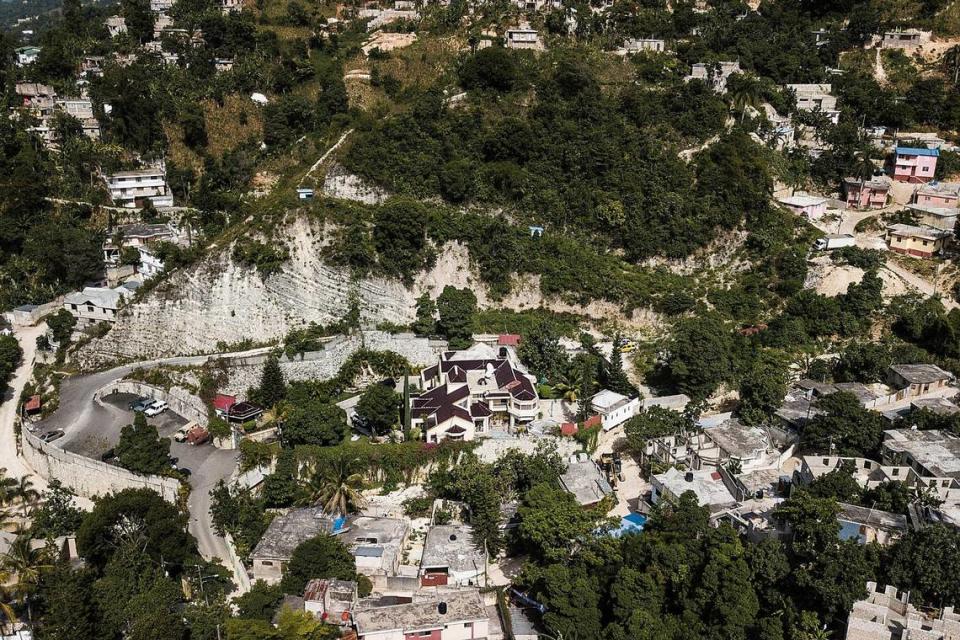Haiti’s acting prime minister to step down Tuesday, turn over power to PM named by Moïse
- Oops!Something went wrong.Please try again later.
Acting Haitian prime minister Claude Joseph says he plans to transfer power on Tuesday to Dr. Ariel Henry, a neurosurgeon and longtime political stalwart whose designation earlier this month as the next in line for the post was “the final wish of President Jovenel Moïse.”
He’ll be the seventh Haitian prime minister in four years.
“There is no pressure for me to make this decision,” Joseph told the Miami Herald in an interview. “I just decided to transfer power to him because he was the last wish of the president, even though the process wasn’t completed.”

In reaction to the news, Henry, 71, said: “Tomorrow, the reconciliation government that President Jovenel Moïse wanted will be in place.”
The two men have been at the center of a power struggle — along with the head of the Senate, Joseph Lambert, as well as human rights and civic leaders and the political opposition — ever since Moïse’s shocking death.
Moïse, 53, was killed in a brazen middle-of-the-night attack at his private residence in the hills above Port-au-Prince on July 7, while his wife, Martine Moïse, was wounded, resulting in her being flown to Miami for medical care. She returned to Port-au-Prince Saturday, accompanied by security, to help prepare her husband’s state funeral. The funeral will take place Friday in the city of Cap-Haïtien after a period of mourning that will begin Tuesday.
The assassination of Moïse, who became president in 2017 and had been ruling by decree, has left Haiti with an even greater power vacuum. The volatile nation was already reeling from a deepening political and constitutional crisis with non-functioning parliament, a lack of elected mayors and just 10 lawmakers.
At the time of Moïse’s death, he was facing a surge in gang violence and kidnappings — and pressure from the United States and others in the international community to hold general elections before the end of the year.
A neurosurgeon with a public health portfolio is Haiti’s newest prime minister
Though Haiti has remained relatively calm in the days since Moïse’s killing, ongoing gang violence remains a persistent concern. Last week, tensions and shootings in the metropolitan Port-au-Prince area resurfaced with two separate gang-related incidents in Fontamara and Bas Delmas. A number of people were injured and killed, the United Nations said.
The ongoing security challenges, added to the lack of clarity over who will govern in the coming days and months, has been a major worry for the international community, which is opposed to a transitional government and has advocated for elections before the end of the year.
Worried about a push by some civic leaders backing a transitional government and sensing that Henry was facing difficulty forming a government, foreign diplomats over the weekend stepped into the political fray. In a rare statement, they showed support for Henry and called for him to continue to form his government.
In an interview with the Herald, Henry said the main mission of his 17-member Cabinet will be to organize elections. Acknowledging Haiti’s fractious political environment, he said he’s appealing for dialogue.
“We have not been able to convince all of the actors for the time being but we will not [spare] any effort in order to bring more people, more political parties, to the table,” he said.
Henry faces tough challenges ahead, including pulling off an election in an environment where the current nine-member Provisional Electoral Council was handpicked by Moïse and lacks credibility with most of Haitian society. Institutions from the Catholic Church to the private sector, human rights groups and universities last year refused to send representatives to sit on the elections body, in contrast to past efforts.
At the same time, Haitians are still looking for insight into who was behind the killing of Moïse.
His first order of business after the swearing in of his Cabinet, Henry said, will be to meet with interim police chief Léon Charles to get up to date on the ongoing probe into the president’s killing and the overall security climate in Haiti. Violent clashes among armed gangs have displaced more than 16,000 Haitians in poor neighborhoods in the capital since June 1 and raised questions about how the country will be able to pull off a vote, much less safeguard political campaigning.
He also plans to meet with members of the Provisional Electoral Council and the committee charged with writing a new constitution. The committee had been chosen by Moïse, whose push for a constitutional referendum triggered massive protests in the months preceding his death.
Jen Psaki, White House press secretary, said of Joseph’s status: “We have not received an official notification through our embassy.”
Joseph, 43, will remain as part of the new government in his role as foreign minister. He said he has no interest in being associated with a fight for power.
“People thought we were fighting against each other,” he said. “We were never adversaries or rivals. Ariel and I have been talking about what we should do to move the country forward.
“Everyone needs to come together to change the country,” he said, adding that “you don’t need to be in the government to do that. What matters most now is elections.”
Joseph has said that in addition to elections, his top priority is to see the multinational probe into who killed Moïse come to a successful conclusion.
“I will still keep a close eye on it. It’s one of the reasons I stayed in the government,” he said. “It’s because of Jovenel Moïse I am here. Jovenel Moïse put me in those positions — ambassador, ministry of foreign affairs and then prime minister. I have a debt, a moral obligation to him. He has to find justice.”
Michael Wilner of the McClatchy Washington Bureau contributed to this report.

